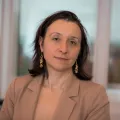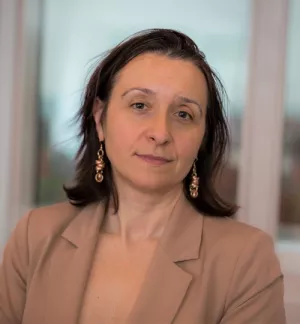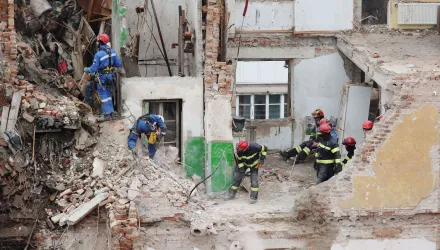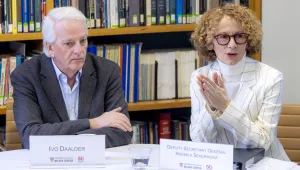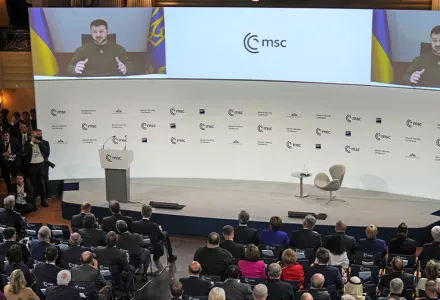
The Project on Managing the Atom (MTA) was invited this year to co-host a side event at the Munich Security Conference (MSC) in partnership with the Center for International Security of Berlin’s Hertie School. The ongoing war in Ukraine, the continuous nuclear saber-rattling of the Russian Federation, and the increasing tension between China and the United States convinced those of us working with MTA that we needed to be part of the conference and, where possible, promote greater understanding among policymakers of the risks of nuclear escalation in both the European and Asian theatres.
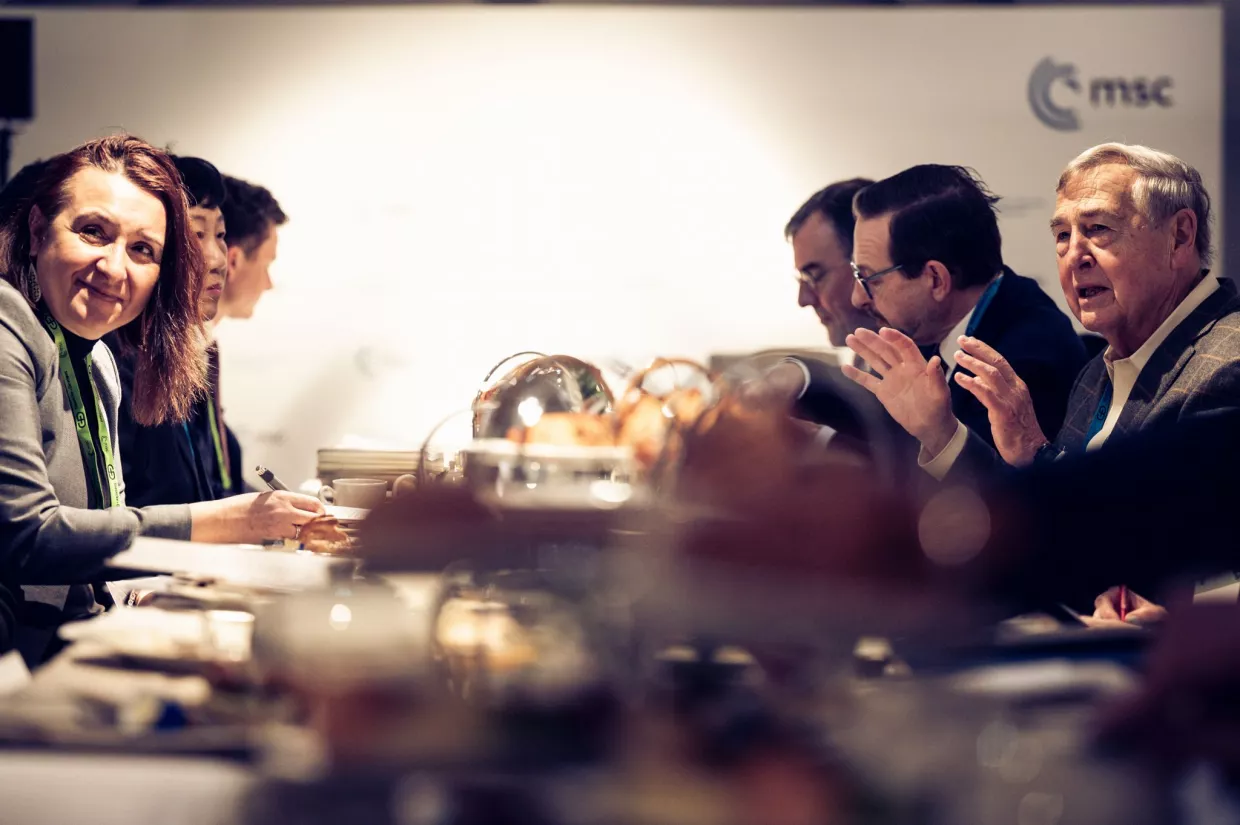
Francesca Giovannini, left, and Graham Allison, right, speak at a Munich Security Conference event. Munich Security Conference
The MTA event was well attended and resulted in a request from the MSC organizers to collaborate on a nuclear risk report for next year’s conference.
As the conference opened, almost all European leaders' clear and unified message was that the Ukraine war constituted a fundamental irreparable break in the global order. In a way, radical and dramatic, Russia was—according to a German diplomat I spoke to during a coffee break—"forever out" from European security architecture. Consequentially, my interlocutor suggested, no business as usual with the Russians will be possible after this.
The slogan that was consistently repeated was even more pressing and consequential: “Putin must lose the Ukraine war at all costs.” As I sat through countless speeches and statements, I wondered what that slogan meant in practice and what victory ultimately looked like for Europe post-Ukraine. It was eventually NATO Secretary Jens Stoltenberg who clarified the end game. "Putin should never be able to claim even a political victory in Ukraine," he said. The allies wanted an uncompromising political and military surrender of Putin. After that, I couldn’t stop thinking about the risks of nuclear escalation and miscalculations that a zero-sum game approach inevitably brings to bear amid the brutality of an unwarranted war at the heart of Europe.
Beyond rhetoric, the Munich Security Conference displayed three critically essential changes in European security: 1. alignment between Northern and Baltic states, 2. rise of a more geostrategic European defense policy, and 3. acknowledgment that the West needs to do better in winning the hearts and minds of the rest of the world.
A well-orchestrated unity between the Baltic leaders and the northern Europeans was central to the Munich conference's core messaging. Countless panels featuring Swedish, Finnish, and Baltic diplomats and politicians underscored how the center of gravity for NATO has fundamentally shifted away from its founders and in favor of the countries neighboring Russia.
Secondly, the decision of the European Union to revamp its European defense industry was celebrated through an "innovation night" that sought to display the most critical advances in defense and military technology across Europe. Discussions of integrated deterrence, innovation in military affairs, and defense procurements dominated the gathering. They showed how much the European project has shifted its emphasis from soft power and multilateralism to competition and defense.
Thirdly, during the conference, the call for the West to engage with the "Global South" rang several times. Panels on some new developments, climate change, and energy security featured Western and Global South leaders. While the topics discussed were necessary, attempting to "engage" with the rest of the world seemed—at least at this conference —forced, anachronistic, and opportunist. Several leaders of Global South countries did not mince words calling out the ambivalent and ambiguous commitment of the Western countries to their specific security and development needs.
The side event that MTA co-hosted with the Hertie School centered around a fundamental question: Will the Ukraine war be a driver for future proliferation worldwide? The event's focus stemmed from a simple observation: Ukraine has been brutally invaded by one of the countries—Russia—that had committed in 1995 to protect the sovereignty of Ukraine in exchange for Ukraine's nuclear disarmament. For many countries today, the apparent and most logical conclusion is that possessing nuclear weapons is the only condition that could guarantee their survival in a world of predatory states.
The MTA event, opened by Professor Graham Allison and General Yao from the People's Republic of China, offered a crucial moment for reflection on the precarious stability of the nuclear order and the urgency of new initiatives. The event featured high-level diplomats and practitioners of allied countries and nonnuclear weapons states. The discussion focused on the risks of nuclear weapon use in Ukraine, the strength of the nuclear taboo in a world of nuclear crises, the potential role of China and the United States in bringing the Ukraine war to a peaceful resolution, and the need for greater cooperation and risk reduction among nuclear weapons states. The event was conducted under Chatham House rules.
In a follow-up meeting after the event, organizers of the Munich Security Conference asked MTA and the Belfer Center to collaborate with them on a nuclear risk report for prime ministers and presidents around the world ahead of the 2024 Munich Security Conference.
The participation of MTA/Belfer Center in these forums is vital for at least three reasons: 1. to exchange recommendations and ideas with practitioners and policymakers based on sound analysis and scholarship 2. to learn from practitioners and policymakers about the most pressing challenges and constraints they face; and 3. to provide an apolitical and non-ideological space for conversation among great powers currently struggling to engage with each other.
Institutions like the Belfer Center are needed more than ever in international settings like the Munich Security Conference, where more than 50 heads of state convene each year. The Project on Managing the Atom plans to be there next year and in the years to come.
FEATURED IN THE SPRING 2023 NEWSLETTER
Giovannini, Francesca. "Center Nuclear Experts Highlight Escalating Risks at Munich Security Conference ." Belfer Center Newsletter, Belfer Center for Science and International Affairs, Harvard Kennedy School. (Spring 2023)

